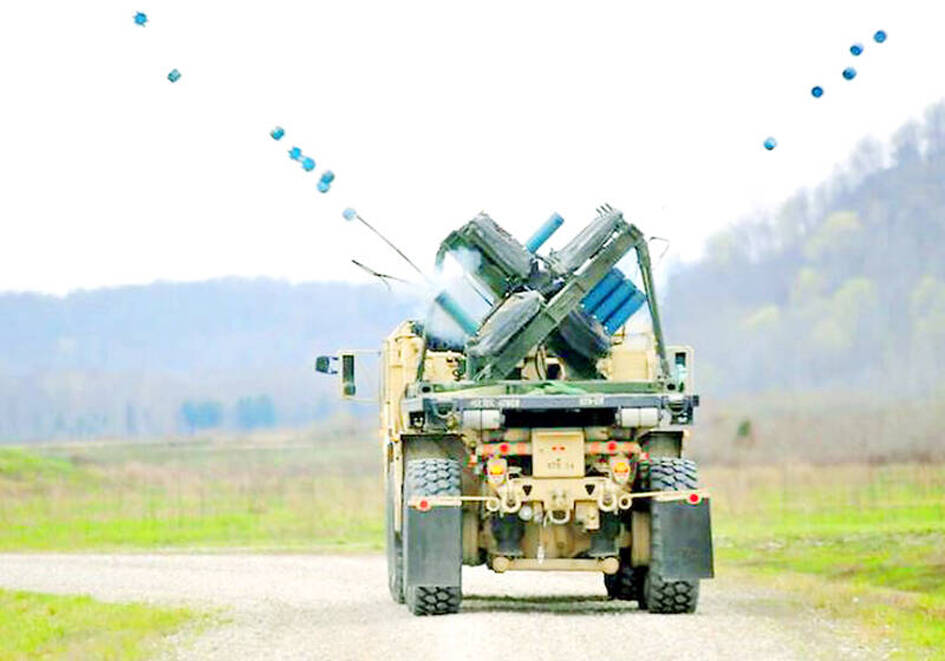The US is to deliver all 14 M-136 Volcano automated mine delivery systems ordered by Taiwan in 2026, instead of sending seven systems last year and seven more two years from now as originally planned, a defense official said yesterday.
Taiwan inked a NT$4.9 billion (US$153 million) contract with the US for the minelayers and related logistical items to be implemented between 2022 and 2029, according to the Ministry of National Defense’s budgetary records.
Speaking on condition of anonymity, the defense official said “delays in the US and various other factors” were to blame for the setback, but did not speculate about whether more delays should be expected.

Photo: screen grab from the US Army Reserve Web site
“The government is communicating closely with the US,” they said.
The M-136 Volcano automated mine delivery system, a mobile mine launcher mounted on a M977A4 HEMTT 10-tonne cargo truck, is used for rapidly deploying anti-tank and anti-personnel mines over a wide area.
The vehicles are designated for combat engineer groups in the 6th, 8th and 10th Army Corps to defend Taiwan proper, the documents showed.
Taiwanese military doctrine envisions the army’s combined arms brigades forming mobile interdiction teams with mechanized infantry and attached combat engineers to deny key areas, roads and bridges to the enemy, sources said.
Volcano mine systems are intended to enhance the flexibility and capability of mobile interdiction teams, an organization the army is considering changing from an ad-hoc task force to a permanent establishment, they said.
Last year, news of the minelayer vehicles’ purchase spurred criticism from opposition party members who said the systems would turn Taiwan into “a landmine island.”
The Republic of China Army Command said the superior minelaying speed, mobility and armored protection of the Volcano mine systems mean they are well suited to anti-armor operations in Taiwan proper’s coastal regions.
The Volcano mine system makes use of magnetic detonators that specifically target armored vehicles and self-destruct timers to limit potential harm to civilians, it said.
Additionally, the Volcano’s mines are dispensed on the ground via launchers and not buried manually under the surface, making the post-conflict removal of the explosive devices relatively easy, the army said.

Trips for more than 100,000 international and domestic air travelers could be disrupted as China launches a military exercise around Taiwan today, Taiwan’s Civil Aviation Administration (CAA) said yesterday. The exercise could affect nearly 900 flights scheduled to enter the Taipei Flight Information Region (FIR) during the exercise window, it added. A notice issued by the Chinese Civil Aviation Administration showed there would be seven temporary zones around the Taiwan Strait which would be used for live-fire exercises, lasting from 8am to 6pm today. All aircraft are prohibited from entering during exercise, it says. Taipei FIR has 14 international air routes and

Taiwan lacks effective and cost-efficient armaments to intercept rockets, making the planned “T-Dome” interception system necessary, two experts said on Tuesday. The concerns were raised after China’s military fired two waves of rockets during live-fire drills around Taiwan on Tuesday, part of two-day exercises code-named “Justice Mission 2025.” The first wave involved 17 rockets launched at 9am from Pingtan in China’s Fujian Province, according to Lieutenant General Hsieh Jih-sheng (謝日升) of the Office of the Deputy Chief of the General Staff for Intelligence at the Ministry of National Defense. Those rockets landed 70 nautical miles (129.6km) northeast of Keelung without flying over Taiwan,

City buses in Taipei and New Taipei City, as well as the Taipei MRT, would on Saturday begin accepting QR code payments from five electronic payment providers, the Taipei Department of Transportation said yesterday. The new option would allow passengers to use the “transportation QR code” feature from EasyWallet, iPass Money, iCash Pay, Jkopay or PXPay Plus. Passengers should open their preferred electronic payment app, select the “transportation code” — not the regular payment code — unlock it, and scan the code at ticket readers or gates, General Planning Division Director-General Liu Kuo-chu (劉國著) said. People should move through the

The Ministry of National Defense (MND) today released images of the military tracking China’s People's Liberation Army (PLA) movements during the latest round of Chinese drills around Taiwan. The PLA began "Justice Mission 2025" drills today, carrying out live-fire drills, simulated strikes on land and maritime targets, and exercises to blockade the nation's main ports. The exercises are to continue tomorrow, with the PLA announcing sea and air space restrictions for five zones around Taiwan for 10 hours starting from 8:30am. The ministry today released images showing a Chinese J-16 fighter jet tracked by a F-16V Block 20 jet and the